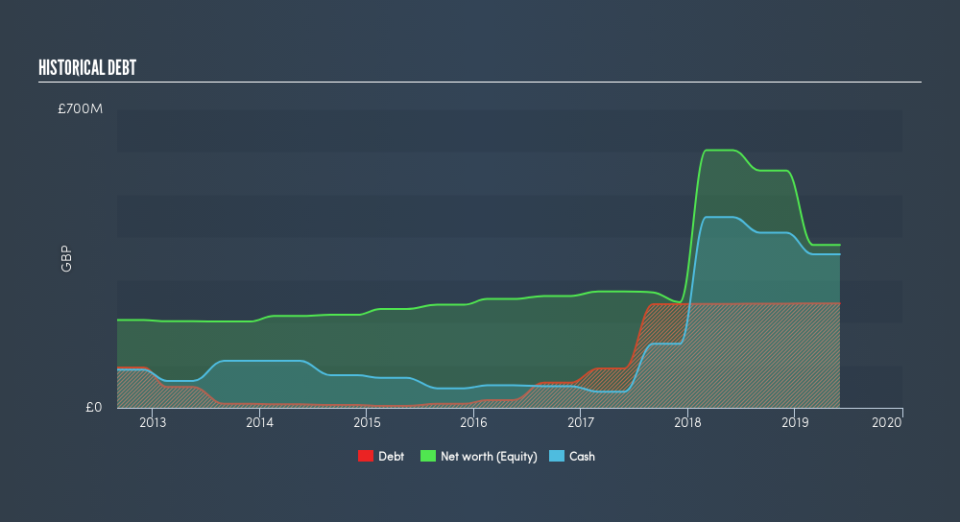Is Ocado Group (LON:OCDO) Using Debt In A Risky Way?

Some say volatility, rather than debt, is the best way to think about risk as an investor, but Warren Buffett famously said that 'Volatility is far from synonymous with risk.' So it might be obvious that you need to consider debt, when you think about how risky any given stock is, because too much debt can sink a company. Importantly, Ocado Group plc (LON:OCDO) does carry debt. But the more important question is: how much risk is that debt creating?
Why Does Debt Bring Risk?
Debt assists a business until the business has trouble paying it off, either with new capital or with free cash flow. Ultimately, if the company can't fulfill its legal obligations to repay debt, shareholders could walk away with nothing. However, a more usual (but still expensive) situation is where a company must dilute shareholders at a cheap share price simply to get debt under control. Of course, plenty of companies use debt to fund growth, without any negative consequences. The first step when considering a company's debt levels is to consider its cash and debt together.
See our latest analysis for Ocado Group
How Much Debt Does Ocado Group Carry?
The image below, which you can click on for greater detail, shows that Ocado Group had debt of UK£244.8m at the end of June 2019, a reduction from UK£375.2m over a year. However, it does have UK£360.1m in cash offsetting this, leading to net cash of UK£115.3m.
How Strong Is Ocado Group's Balance Sheet?
According to the last reported balance sheet, Ocado Group had liabilities of UK£411.0m due within 12 months, and liabilities of UK£506.7m due beyond 12 months. Offsetting this, it had UK£360.1m in cash and UK£144.8m in receivables that were due within 12 months. So it has liabilities totalling UK£412.8m more than its cash and near-term receivables, combined.
Since publicly traded Ocado Group shares are worth a total of UK£8.03b, it seems unlikely that this level of liabilities would be a major threat. Having said that, it's clear that we should continue to monitor its balance sheet, lest it change for the worse. While it does have liabilities worth noting, Ocado Group also has more cash than debt, so we're pretty confident it can manage its debt safely. When analysing debt levels, the balance sheet is the obvious place to start. But it is future earnings, more than anything, that will determine Ocado Group's ability to maintain a healthy balance sheet going forward. So if you want to see what the professionals think, you might find this free report on analyst profit forecasts to be interesting.
Over 12 months, Ocado Group reported revenue of UK£1.7b, which is a gain of 9.8%. That rate of growth is a bit slow for our taste, but it takes all types to make a world.
So How Risky Is Ocado Group?
We have no doubt that loss making companies are, in general, riskier than profitable ones. And the fact is that over the last twelve months Ocado Group lost money at the earnings before interest and tax (EBIT) line. Indeed, in that time it burnt through UK£143m of cash and made a loss of UK£174m. However, it has net cash of UK£360m, so it has a bit of time before it will need more capital. Overall, we'd say the stock is a bit risky, and we're usually very cautious until we see positive free cash flow. For riskier companies like Ocado Group I always like to keep an eye on whether insiders are buying or selling. So click here if you want to find out for yourself.
Of course, if you're the type of investor who prefers buying stocks without the burden of debt, then don't hesitate to discover our exclusive list of net cash growth stocks, today.
We aim to bring you long-term focused research analysis driven by fundamental data. Note that our analysis may not factor in the latest price-sensitive company announcements or qualitative material.
If you spot an error that warrants correction, please contact the editor at editorial-team@simplywallst.com. This article by Simply Wall St is general in nature. It does not constitute a recommendation to buy or sell any stock, and does not take account of your objectives, or your financial situation. Simply Wall St has no position in the stocks mentioned. Thank you for reading.

 Yahoo Finance
Yahoo Finance 
